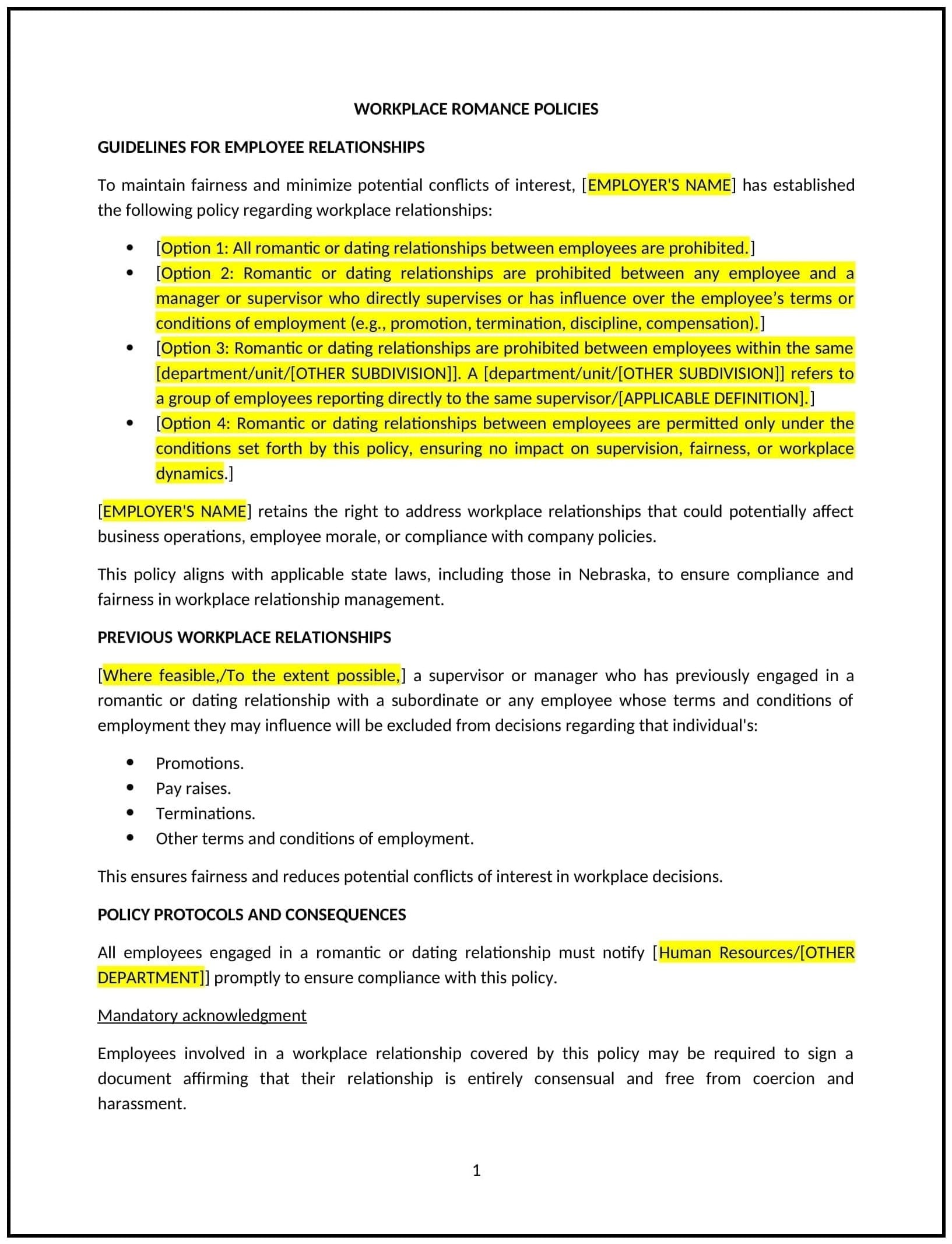Got contracts to review? While you're here for policies, let Cobrief make contract review effortless—start your free review now.

Customize this template for free
Workplace romance policy (Nebraska)
A workplace romance policy helps Nebraska businesses manage relationships between employees that may arise in the workplace. This policy outlines the company’s stance on romantic relationships, especially when one party holds a position of authority over the other, and the steps employees should take if they enter into a romantic relationship at work. It is designed to prevent conflicts of interest, ensure professionalism, and maintain a respectful and productive work environment.
By adopting this policy, businesses in Nebraska can mitigate potential risks related to workplace relationships while promoting a fair and unbiased work culture for all employees.
How to use this workplace romance policy (Nebraska)
- Define workplace romance: Clearly define what constitutes a workplace romance, including relationships between employees, managers, and any relationships that may involve a power dynamic, such as supervisor-subordinate or coworker-to-coworker relationships.
- Outline the company’s stance on workplace romance: The policy should clearly state the company’s position on workplace romance, including any restrictions on relationships between certain roles, such as supervisors and direct reports. It should also clarify whether personal relationships are allowed but subject to disclosure or other procedures.
- Establish disclosure requirements: Specify when and how employees must disclose romantic relationships, particularly in cases where one employee supervises or has influence over another’s job. Disclosure helps the company address potential conflicts of interest or situations that could create discomfort among other employees.
- Provide guidance on maintaining professionalism: Emphasize that employees in romantic relationships should maintain a professional demeanor in the workplace, separating personal matters from work duties. Outline expectations for behavior, including how employees should interact in the office and whether romantic behavior is acceptable during work hours.
- Address conflicts of interest: Clearly state the procedures for addressing potential conflicts of interest that may arise from workplace romances, especially those that involve a supervisor and their subordinate. This may include reassigning job responsibilities, removing reporting lines, or other measures to prevent bias or favoritism.
- Establish consequences for policy violations: Define the consequences for violating the workplace romance policy, which may include disciplinary action if the relationship creates conflicts of interest, affects team dynamics, or leads to complaints of harassment or favoritism.
- Ensure confidentiality: Specify how the company will handle any personal information related to workplace relationships, ensuring that disclosures are handled confidentially and that employees’ privacy is respected.
- Review and update: Regularly review and update the policy to ensure it aligns with changes in Nebraska state laws, workplace dynamics, or company values. The policy should be flexible enough to address new situations that may arise.
Benefits of using this workplace romance policy (Nebraska)
This policy provides several benefits for Nebraska businesses:
- Promotes a professional work environment: By clearly defining expectations for romantic relationships in the workplace, businesses can help prevent inappropriate behavior, conflicts of interest, and distractions that could negatively impact productivity.
- Reduces risks of harassment or favoritism: The policy helps businesses address potential issues of favoritism, bias, or perceived conflicts of interest in romantic relationships, especially between supervisors and their direct reports.
- Supports workplace fairness and equity: A transparent policy ensures that all employees are treated fairly, regardless of their personal relationships, and that no employee is unfairly advantaged or disadvantaged due to a workplace romance.
- Protects company reputation: Addressing workplace romance proactively helps mitigate the risks of complaints or legal action related to workplace harassment, discrimination, or unfair treatment, enhancing the company’s reputation and credibility.
- Encourages transparency and open communication: The policy encourages employees to disclose relationships where necessary, fostering an open and communicative culture within the organization.
Tips for using this workplace romance policy (Nebraska)
- Communicate the policy clearly: Ensure all employees are aware of the workplace romance policy and understand its guidelines. Include the policy in employee handbooks and communicate it regularly during onboarding and training sessions.
- Encourage transparency: Encourage employees to disclose romantic relationships in a timely manner, particularly when conflicts of interest or power dynamics are involved. This helps the company address any potential issues before they escalate.
- Foster an inclusive work culture: While managing workplace romances, it is important to create a culture where all employees feel respected and valued, regardless of their personal relationships.
- Monitor relationships for potential issues: Keep an eye on how relationships evolve in the workplace to ensure that they do not affect productivity, team dynamics, or employee morale. Be proactive in addressing any concerns or complaints from employees.
- Review the policy periodically: Regularly review the policy to ensure that it stays relevant and aligned with company values, changes in the law, and evolving workplace dynamics.